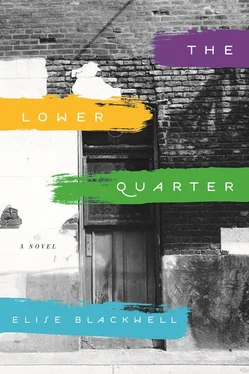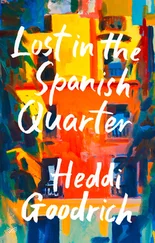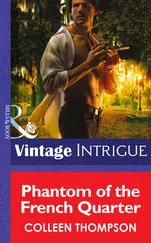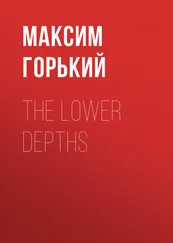“Should you have asked more questions, thought about it a little more — why those girls would be there? Why I would be there? Yes, but you can blame that on youth, too, and you should also give yourself some credit for what you did after. Once you did know, you did the right thing. I have not forgotten that you saved me, and you should not forget that, either. Anyway, it wasn’t you I was thinking about.”
Clay’s sternum tightened as it always did when he thought about the other men who had been in that same room, what else she had gone through. He hoped he had been the worst of it, for her sake, and for his own he hoped that he hadn’t. Of course he had never asked her, and she had never told him much of anything without him asking first. Even now, he couldn’t ask her the obvious next question.
She answered it anyway. “I was thinking of the first person, the biggest money. It is men like that behind all of it, always, for everyone.”
Now Clay turned to Johanna, holding her by both shoulders as gently as he could while still holding her in place. “And you took something from him, didn’t you? Something he wants back.”
She stayed perfectly still yet seemed to shrink inside his hold, reducing the contact between them. “I didn’t take it from him. Ladislav did. He sold me to that man and used the access that gave him to rob the house. Paintings, jewelry, money, some guns. And when I left Ladislav, when you came back to get me, I took that one thing.” She looked frantic, an expression he had not seen on her face for years. “Only that one thing — I don’t know what happened to any of the rest of it; that was all Ladislav. All I can say is that what I took belongs to me. It is mine, and I am going to keep it.”
Clay was glad he’d killed Ladislav. He hadn’t intended to, not exactly, but he was glad after it happened — had relished it even while it was happening, that delicious sound of the trauma that would take the ugly little life away — and he had decided he’d be glad even if he got caught. But now he worried, because if Ladislav knew that Johanna had taken one of the paintings, then he might have told anyone. What Clay already knew crystallized: Ladislav was in New Orleans because of his father. Perhaps his father had intended to buy the paintings Ladislav had with him, though that seemed too simple.
“The man who Ladislav robbed, that’s the man I want dead,” Johanna said. “But I want to do it myself, so he will know who and he will know why.”
As he looked at her, Clay had no idea how far she’d go or whether she’d have any idea how to go about it. If he let her, even if he helped her, it would end badly for her. Bad was the only way it could end.
“You like your life here,” he said, repeating back to her what she had said only a few minutes earlier.
Now Johanna reached again for him, grabbing his forearm with surprising force. “You can find out who he is. You can find out and tell me his name. That is what I want from you.”
Later in the day, when he replayed the conversation in his mind, wishing he had asked more questions while understanding that he could not have — not without invading Johanna’s sense of privacy and causing her more discomfort and eliciting from her more anger — he realized how calmly she had taken the news that he had killed Ladislav. Perhaps it was because she had known all along, and so there was no surprise to his admission. And perhaps it was because that was what she’d always thought Clay to be: a person who commits violence on others. Or maybe Johanna had expressed no surprise simply because she was beyond surprise; she was a person who expected that anything could happen at any time.
That he was not such a person, not yet anyway, was proved by what she said next: “By the way, you should know that a policeman came to my studio. He’s looking for my painting, too, and I suppose he’s also looking for you.”
Distorted by the distance and the angle and the now almost-full rain, the left peak of the upriver bridge looked higher than the right, as though the trip to the West Bank was an uphill one. Clay imagined pressing the left side down, leveling the road. Maybe he could protect Johanna and give her what she wanted at the same time. Perhaps all his childish pranks and petty acts of revenge had a direction and purpose. Perhaps they had been leading him toward a single act of reparation, of real justice.
Marion
Nose to the grindstone,” her father had always advised her about school. While she’d known what the phrase meant, if not its origin, it had never made any sense to her. Her parents spoke often of working hard, but when she saw them at work they were strolling the floor of the small furniture showroom, making small talk with customers, or perhaps sitting over a bit of bookkeeping. Now she recognized that their hard work was the boredom of it all. And the worry: The store had paid the family’s bills and nothing more. Surely one or both of her parents had held other ambitions, occupational or financial, but she’d never glimpsed them. Her aesthetic life growing up had been a slightly cheaper version of what everyone else in their neighborhood seemed to have: silver tinsel on the Christmas tree, casseroles made with cream-of-something soup, homemade cookies studded with off-label cereal, mustard-yellow kitchen appliances when everyone else was sensibly returning to white. Teachers and electricians bought dinette sets at their store. Doctors and lawyers drove to Mobile or New Orleans for theirs. Even her parents’ deaths had been modest: early but not tragically so, closely spaced but not eerily so, and of the most common causes.
Her childhood home had had no influence on Marion’s palette — or perhaps only as something to react against. But Biloxi itself was evident on the cardboard rectangle now: the mossy grays and greens of Spanish moss and algae, the many lighter greens and grays of the Gulf, the dirty whites of the frothy small waves, the pinks and blues and transparent blacks of the streaked sky, pelican brown and pelican gray. Maybe that was homesickness: the desire for the colors of your earliest longings for escape.
She was trying to mix one of the colors of Biloxi’s sand when she heard the screen door open and a rap on the bolted door behind it. The idea that Eddie had figured out where she lived thrilled her for a moment, but then she realized that it must be a delivery. She’d ordered some new brushes that she couldn’t find in New Orleans, at least not until the larger art supplies reopened, if they reopened.
She didn’t recognize the guy on her stoop at first look. He was heavier than the last time she’d seen him, his face bready, his eyes deeper set, which made his nose seem longer and more crooked. His look had changed, too: black jeans with chains, gray hoodie with the name of some band, blackened shaggy hair, large black discs deforming his earlobes. Height hadn’t been distributed fairly in her family, and he hulked in her doorway, looking down on her even from his slump.
“I know you can’t be happy to see me, but I hope you’ll hear me out.”
“I don’t have any money, and I don’t have anything worth stealing,” she said, turning away from him but leaving the door open for him to follow.
“I’m clean,” he told her when they were seated, he on the couch and she on the beanbag chair that constituted the only furniture in the front room of the three shotgunned rooms her rent paid for. “More than clean: I’m straight edge.”
“So this is some step for you, then? You’re here to make amends?” She heard the resentment in her voice, how it made her sound like his teenage sister and not a storybook orphan.
“Something like that, Marion. I was an addict, and addicts do bad things. Part of my recovery is to set as many of those right as I can.”
Читать дальше












